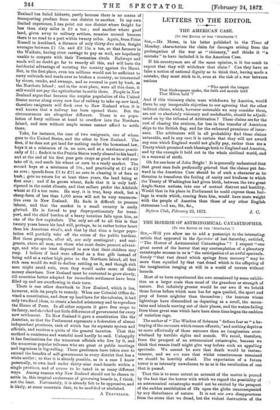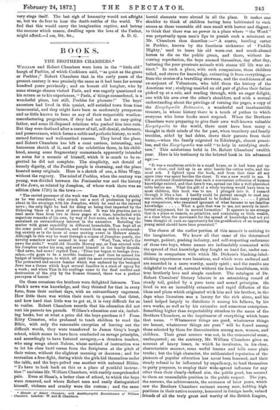THE HORROR OF ASTRONOMICAL CATASTROPHES. [TO THE EDITOR OF THE
SPEOTATOR.1
you allow me to add a postscript to the interesting article that appeared in the Spectator of last Saturday, entitled,. "The Horror of Astronomical Catastrophes " ? I suspect " one. great secret of the horror that any contemplation of a planetary catastrophe arouses in us is" the anticipation of an awful spectacle.. Surely "that vast dread which springs from memory" may be- more than equalled by that vast dread which is the offspring of the imagination ranging at will in a world of terrors without bounds.
Most of us have experienced the awe occasioned by some exhibi- tion on a larger scale than usual of the grandeur or strength of nature. But infinitely greater would be our awe if we behelc. those forces before which man has for ages quailed, the sport and prey of forces mightier than themselves ; the heavens whose lightnings have discomfited us departing as a scroll, the moun- tains and islands moving out of their places, and the waters failing from those great seas which have been since time began the emblem of resistless rage.
The author of "The Wisdom of Solomon " defines fear as" a be- traying of the succours which reason offereth," and nothing deprives us more effectually of those succours than an imagination over- whelmed by terrible sights and sounds. We recoil, therefore, from the prospect of an astronomical catastrophe, because we think that reason itself might give way before such an appalling spectacle. We cannot be sure that death would be instan- taneous, and we are sure that whilst consciousness remained we should be horribly afraid. The expectation of a future terror is as intensely unwelcome to us as is the recollection of one that is passed.
That this is to some extent an account of the matter is proved by the fact that the horror with which we regard the possibility of an astronomical catastrophe would not be excited by the prospect of the sudden annihilation of life upon the globe unaccompanied by any disturbance of nature. It is not our own disappearance from the scene that we dread, bat the violent destruction of the very stage itself. The last sigh of humanity would not affright us, but we do fear to hear the death-rattles of the world. We feel that this would carry the imagination captive, and betray the succour which reason, dwelling upon the love of the Father,



































 Previous page
Previous page